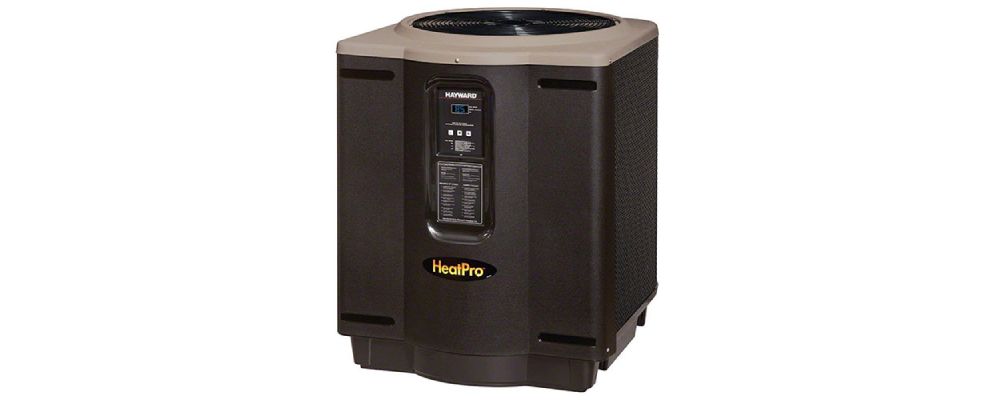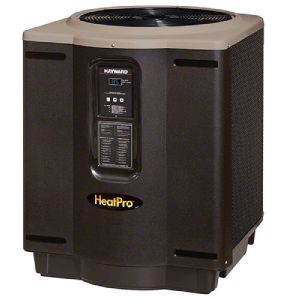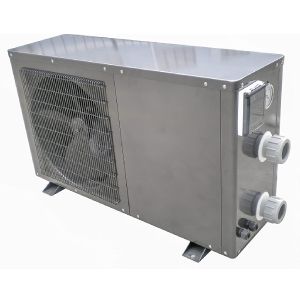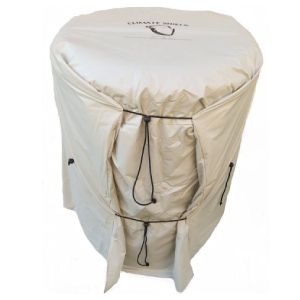- Salt Water Pool and Spa
- Inground Pool Heaters
- Pool Heat Pump Heaters
Pool Heat Pump Heaters
A pool heat pump is an incredibly efficient way to keep your pool water warm and comfortable every day during the pool season. They are the most popular way to heat pools in warmer climates and for good reason, they deliver heat for up to 75% less energy cost than traditional natural gas, propane and electric resistance heaters. They also boast the only reliable way of being able to cool water temperatures down during hot summer months.

If you are in the market for a heat pool pump we are going to go over everything you need to know including ideal operating temperature ranges and average monthly costs. Whether you are looking to heat or cool your pool water you really can't go wrong with heat pumps for swimming pools. If you ever wondered if switching to an electric heat pump is a good idea, we'll educate you on everything you need to know on our list of the best pool heat pumps on the market today.
How a Pool Heat Pump Works
The pool industry is now benefitting from the same technology that's been used to heat and cool homes and businesses for years. Now you can keep your pool at a set temperature all season long and forget about it without breaking the bank. A pool heat pump is a device used to heat swimming pool water by transferring heat from the surrounding air to the pool water.
A pool heat pump works by collecting heat from the surrounding air and transferring it to the pool water. It uses a fan to draw in air, which passes over an evaporator coil containing a refrigerant. The refrigerant evaporates, absorbing heat from the air. The heated refrigerant then passes through a compressor, increasing its temperature and pressure. The hot refrigerant flows through a condenser coil, where it releases heat to the pool water. The process repeats as long as the heater is running, maintaining the desired pool temperature.
Best Pool Heat Pumps
A pool heat pump buying guide wouldn't be complete without a list of the best heat pump brands on the market. Whether you are looking for the best pool heat pump for your inground pool, above ground pool or salt water pool we've covered it. This list includes the absolute best based on Amazon customer reviews and also includes the quietest heat pump brands so you won't even notice it when it's on.
Hayward HeatPro Pool Heat Pumps
The Hayward HeatPro titanium heat pump square heater is the quietest, most efficient and the most durable on the market today. The acoustic compressor cover and fan blade ensures both quiet operation and efficient performance for many years. The titanium heat exchanger is an industry leader providing maximum heat transfer, salt water and chemical corrosion resistance making it impervious to deterioration. With over 80 years experience manufacturing inground pool heaters you can't go wrong with Hayward.
Hayward HeatPro 140,000 BTU Heat Pump for Inground PoolsIf you click on this link and make a purchase, we may earn a commission. |
FibroPool Pool Heat Pumps
The FibroPool high performance electric heat pump is powered by clean electricity, reducing harmful environmental effects. This unit is compatible with inground pools up to 10,000 gallons and above ground pools up to 21 feet round. They perform best in climates with humidity above 50 degrees, and it's recommended to use a gas pool heater in climates below 50 degree humidity. The titanium heat exchangers ensure maximum energy efficiency that's unmatched in its class which will result in low energy bills.
FibroPool Pool Heat Pump Heater for Above Ground and Inground PoolsIf you click on this link and make a purchase, we may earn a commission. |
Pool Heat Pump Advantages and Disadvantages
The pool heat pump pros and cons are in important part of making an informed decision about purchasing the right unit for your pool. The most important factor is to consider your geographic location and how warm and humid your climate tends to be during the swimming season. If you want to keep your pool heated into the cooler months of the year you should definitely consider a gas heat in most parts of the world.
Pool Heat Pump Advantages
- Energy Efficiency: Heat pumps are known for their high energy efficiency. They transfer heat from the surrounding air to the pool water using electricity, making them more energy-efficient than other heating options such as gas heaters.
- Cost Savings: Due to their energy efficiency, they can result in significant cost savings over time. While the initial purchase and installation costs may be higher compared to other heaters, the long-term operational costs tend to be lower.
- Environmental Friendliness: They produce fewer greenhouse gas emissions compared to fossil fuel-powered heaters. By utilizing heat from the air, they reduce reliance on non-renewable energy sources.
- Consistent Heating: They provide consistent and reliable heating for your pool. They can maintain a desired temperature regardless of weather conditions, making them suitable for year-round pool use.
- Long Lifespan: Heat pumps are generally built to last, with an average lifespan of around 10 to 20 years. Proper maintenance and care can further extend their longevity.
- Safety: Pool heat pumps do not involve combustion or open flames, which eliminates the risk of gas leaks or carbon monoxide poisoning. They operate safely and quietly.
- Versatility: They can be used for both heating and cooling purposes. In addition to heating your pool, they can also be utilized for cooling during hot summer months, offering multi-functionality.
- Low Maintenance: They require minimal maintenance. Regularly cleaning or replacing the air filters and inspecting the unit are typically the primary maintenance tasks.
- Compatibility: They can easily integrate with existing pool equipment and infrastructure, making them compatible with most pools.
- Rebates and Incentives: Depending on your location, there may be rebates, tax credits, or other incentives available for installing an energy-efficient heat pump heaters, which can further offset the initial costs.
Pool Heat Pump Disadvantages
- Initial Cost: Heat pump heaters typically have a higher upfront cost compared to other heating options such as gas heaters. The initial investment may be a barrier for some pool owners.
- Climate Dependence: They are most effective in moderate climates where the ambient air temperature doesn't drop significantly. In colder regions, their efficiency may be reduced, and supplemental heating might be required.
- Slower Heating: They tend to have a slower heating rate compared to gas heaters. It may take longer to reach the desired pool temperature, especially during cooler weather conditions.
- Reliance on Air Temperature: Since heat pumps extract heat from the surrounding air, their efficiency and heating capacity can be affected by variations in air temperature. In colder climates, the performance may decrease, requiring longer heating cycles.
- Size and Space Requirements: They can be relatively large and require adequate space for installation. It's essential to ensure you have sufficient space available near the pool equipment area.
- Electrical Requirements: They operate using electricity and may require a dedicated electrical circuit or higher voltage supply. This could involve additional electrical work during installation.
- Noise Level: While modern pool heat pumps are designed to operate quietly, some models may produce a noticeable level of noise during operation. This could be a consideration for pool owners who prioritize a noise-free environment.
- Maintenance Considerations: Although they generally require low maintenance, they may be more complex to service compared to simpler heating options like gas heaters. Repairs or maintenance tasks may require professional assistance.
- Sensitivity to Air Quality: They rely on clean air to function optimally. Poor air quality, such as high levels of pollution or debris, can impact their performance and potentially lead to maintenance issues.
- Limited Cooling Capability: While heat pumps can provide cooling functionality, the cooling capacity of heat pump pool heaters is generally lower than dedicated pool cooling systems. If significant cooling is required, alternative options might be more suitable.
Pool Heat Pump or Gas Heater
There are three main differences between a pool heat pump and a gas pool heater. The first is that a pool heat pump is only effective in warm weather and shouldn't be used when temperatures fall below 50℉ or 10℃. A gas pool heater on the other hand is ideal for any temperature, including cold climates and cooler spring or fall months when you want to extend your pool season.
Another big difference is the time to heat speed. A gas pool heater is very fast and will raise an average pool 1-2℉ every hour. A pool heat pump can take several hours to see a change of even 1℉. Lastly, you can expect to pay 3-7 times more to heat your pool using natural gas, propane or electricity versus using heat pump technology.
Pool Heat Pump or Solar Heater
When comparing a pool heat pump and a solar powered pool heater they are actually quite similar in a lot of ways. They both cost about the same to purchase and their operating costs are quite low. A solar heater is free to operate which of course is less than even the best heat pump technology in warm temperatures.
A heat pump can keep a desired set temperature all season long easier than a solar pool heater, but there are solar controllers that will automate temperature controls for an additional cost and set up. They are both reliant on either warm temperatures or sufficient sunlight hours and will become less effective during cold or overcast conditions.
The biggest difference is a pool heat pump will take up a lot less space than a quality solar heater. The footprint of a heat pump is similar to a gas or electric heater, where a solar heater may require up to 1000 square feet of panels to adequately heat a large pool. A trend we are seeing is owners using heater combinations to increase efficiency, a heat pump and gas heater combo or pool heat pump and solar heater combo.
Pool Heat Pump Costs
Pool heat pump costs vary significantly depending on where you live, how often you use a cover and the price for electricity in your region. The following pool heat pump monthly cost estimates are for a 1,000 square foot outdoor pool kept at 80℉ with a heat pump COP of 5.0 and an electricity price of $.085/kWh. This information about pool heat pump costs is courtesy of energy.gov.
Location
Miami
Phoenix
Dallas
Los Angeles
Seattle
Season
Jan - Dec
Mar - Oct
Apr - Oct
May - Oct
Jun - Aug
No Cover
$122
$109
$139
$202
$300
Covered
$25
$18
$23
$26
$72
We can see that the monthly cost to keep a pool heated to 80℉ with a pool heat pump varies significantly depending on where you live and if you keep it covered. The importance of using a solar pool cover to reduce heat loss is very evident in this chart. You can reduce heating costs by up to 85% by using a cover when the pool is not in use.
The price to purchase a pool heat pump varies depending on size but you can expect to pay between $2,000-$4,500 for a top rated pool heat pump. In addition to the purchase price you should budget $400-$500 for installation by a certified pool technician. The cost to service a heat pump is similar to electric and gas heaters, you might find our pool heat pump troubleshooting page helpful.
Pool Heat Pump Sizing
Pool heat pump sizing requires a few easy calculations and understanding weather trends in your area. The goal is to determine how many BTU's of output you will need in the coldest month that you should be using a heat pump to heat your pool. We have used the coldest month with an average temperature higher than 50℉ and we are going assume that you want to achieve a water temperature of 80℉ in a 1,000 square foot pool.
Location
Miami
Phoenix
Dallas
Los Angeles
Seattle
Month
January
March
April
May
June
Temp
60℉
54℉
56℉
57℉
53℉
BTU's
240,000
312,000
288,000
276,000
324,000
The following formula is used to determine the amount of BTU's per hour required for Dallas:
Pool Area x Temperature Rise x 12 = Required BTU's per hour
1,000 x 24 (80-56) x 12 = 288,000 BTU's per hour required in April in Dallas, TX
Temperature rise is the difference between the air temperature and the desired temperature of your pool water. This number will change constantly so we take monthly averages to work this formula out. Swimming pool heat pumps range anywhere between 40,000-150,000 BTU's and increase in cost the higher the BTU rating.
You can get a rough idea of how many BTU's will be needed to heat your pool throughout the day by using the above examples. You should add at least 10% BTU rating to ensure you have enough heating ability for things like wind or when the cover is not being used - wind can create a loss of up to 50,000 BTU's. An oversized pool heat pump will also reduce heating times and ensure that the heater works properly.
Pool Heat Pumps and Salt Water
If you are a salt water pool owner you can use a pool heat pump worry free because of the titanium heat exchangers used are incredibly resistant to rust and corrosion. When purchasing a pool heat pump heater make sure to check that they in fact have this feature. You can enjoy the best swimming experience in the world in warm temperatures all season long with a salt water pool and heat pump combination.
Pool Heat Pump Winterizing
- Power Off: Turn off the power supply to the heat pump heater at the circuit breaker or main electrical panel.
- Shut Off Water Flow: If your heat pump has a dedicated water shut-off valve, close it to prevent water from flowing through the unit during the winter. This will help protect the internal components from freezing and potential damage.
- Drain Water: Drain any remaining water from the heat pump heater. This can usually be done by opening drain plugs or valves located on the unit. Consult the manufacturer's instructions for the specific drainage procedure for your heat pump model.
- Clean and Remove Debris: Clean the exterior of the heat pump heater, removing any debris or dirt that may have accumulated. Ensure the surrounding area is clear of leaves, branches, or other objects that could impede proper airflow or cause damage during winter.
- Cover or Protect: Consider covering the heat pump heater with a suitable cover or using a winterizing cap specifically designed for heat pumps. This will help shield it from harsh weather elements and prevent debris from entering.
- Inspect and Secure: Before finalizing the winterization process, inspect the heat pump for any signs of damage or wear. Address any issues or contact a professional for repairs if necessary. Additionally, ensure that all panels, access doors, and fittings are securely closed.
- Follow Manufacturer's Instructions: It's essential to consult the specific manufacturer's guidelines and instructions for winterizing your heat pump heater. They may provide additional steps or recommendations tailored to your unit.
Pool heat pump winterizing is important to enjoying your investment for many years. It requires removing fittings and removing all water from the heater and plumbing just as you would your filter and system with a shop vac or pressure generator. A great product to use is a pool heat pump cover that will help protect it from rain, snow and other potentially harmful conditions. We hope you found this page about pool heat pumps educational and you enjoy many years of affordable heat.
Universal Pool Heat Pump Winter Cover Climate ShieldIf you click on this link and make a purchase, we may earn a commission. |
Pool Heat Pump FAQs
Are pool heat pump heaters energy-efficient?
Are pool heat pump heaters energy-efficient?
Yes, pool heat pumps are known for their incredibly high energy efficiency compared to other heating options, especially in mild and humid climates.
Can a pool heat pump heater work in cold climates?
Can a pool heat pump heater work in cold climates?
While they can work in cold climates, the efficiency will decrease, and a supplemental form of heating like gas or propane may be required.
How long does a pool heat pump heater last?
How long does a pool heat pump heater last?
On average, a well-maintained heater can last between 10 to 20 years.
How do I maintain a heat pump pool heater?
How do I maintain a heat pump pool heater?
Regular maintenance includes cleaning the coils, monitoring performance, and following the manufacturer's instructions for care and maintenance.
Disclaimer
Please use all appropriate and proper safety precautions when attempting projects on this website. All projects are attempted at the reader's own risk.
Salt Water Pool and Spa™ participates in the Amazon Services LLC Associates Program, as an Amazon Associate we may earn a commission from qualifying purchases.


